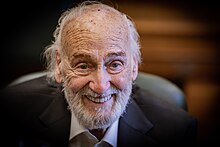|
Héctor Alterio
Héctor Benjamín Alterio Onorato (born 21 September 1929) is an Argentine theatre, film and television actor, well known both in Argentina and Spain. BiographyHéctor Benjamín Alterio Onorato was born in Chacarita, Buenos Aires on 21 September 1929, to parents from Carpinone, Italy.[1][2] Alterio's acting debut came in 1948 in stage play Cómo suicidarse en primavera ('How to commit suicide in spring').[3] After finishing drama school, he created the Nuevo Teatro ("New Theatre") company in 1950, where he worked until 1968 and helped change the Argentine theatrical scene of the 1960s. He also worked in the Argentine cinema. His debut on the silver screen took place in Alfredo Mathé's Todo sol es amargo (Every sun is bitter) in 1965. He then participated in many of the most important Argentine movies of the 1970s, including La Patagonia rebelde (The Rebel Patagonia), which was awarded a Silver Bear at the 24th Berlin International Film Festival.[4] His voice was used in Ya es tiempo de violencia (1969), an anonymous film about the Cordobazo riots which took place the same year. The film was produced by Enrique Juárez, close to the Grupo Cine Liberación. While in Spain in 1975, he received death threats from the Argentine Anticommunist Alliance. He decided not to return to Argentina and remained in exile. He also obtained Spanish citizenship.[1]  Consequently, Alterio began to work in Spanish films, including A un dios desconocido (1977) and received the Best Actor award at the Donostia-San Sebastián International Film Festival, and El Nido (1980), and for his effort received the Best Actor award from the Association of Latin Entertainment Critics in 1983. After the restoration of democracy in Argentina[broken anchor] in 1982, Alterio worked in films produced in both countries and some co-productions. In 2004, he received an Honorary Goya Award for his lifetime body of works.[5] Religiously, Alterio is an atheist.[6] Roles in Academy Award-nominated filmsHéctor Alterio has been in five Oscar-nominated as Best Foreign Language Film pictures:
The fourth of them won the award in the 58th Academy Awards, and was also nominated as Best Original Screenplay. All of these films, except for The Nest, which was submitted by Spain, has been submitted to the awards by Argentina. Selected filmography
AwardsWon:[7]
Nominated
References
External linksWikimedia Commons has media related to Héctor Alterio.
|
||||||||||||
